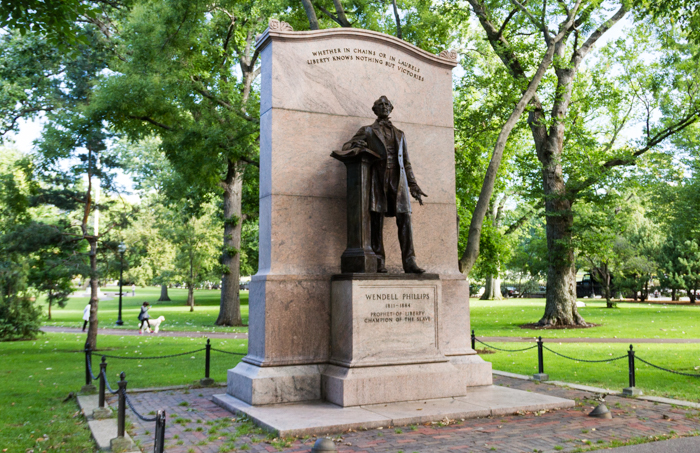
The eight-foot standing sculpture of Wendell Phillips (1811-1884) along the Boylston Street path in the Public Garden was designed by famous sculptor Daniel Chester French on a base designed by architect Henry Bacon, collaborators best known for the iconic Lincoln Memorial in Washington, D.C. The larger than life bronze statue sits atop the 12-foot base, in front of a stone wall inscribed with one of Mr. Phillips’ most famous quotes:
“Whether in chains or in laurels liberty knows nothing but victories”
The broken chain in his left hand symbolizes freedom and liberation, while his left is clenched as if making an important point as an orator. Commissioned by the City of Boston for $20,000 and cast in 1914, the bronze sculpture was dedicated on July 4, 1915.
Wendell Phillips was the son of Boston’s first mayor, John Phillips, and as a wealthy Harvard Law School graduate he gave up his legal practice to champion the abolitionist cause after hearing a speech by William Lloyd Garrison in 1835 (see Garrison’s statue on Commonwealth Avenue Mall). Two years later, Phillips gave his famous speech at Faneuil Hall condemning the assassination of Elijah Lovejoy, an abolitionist minister and publisher. This speech was considered one of the three most important speeches in American history, along with Patrick Henry’s warning to George III and Lincoln’s Gettysburg address. The eloquence and passion of his oratory earned him the name “The Abolitionist’s Golden Trumpet.” Phillips and Garrison’s subsequent partnership came to define the beginning of the 1840s abolitionist movement, with Phillips taking over as president of the American Anti-Slavery Society after Garrison resigned in 1865.
During the Civil War, he advocated for humane treatment of prisoners. After the Emancipation Proclamation, he supported full civil liberties for freedmen. He felt that Reconstruction had not been a failure, and the main error of the era had been the failure of agrarian reform to redistribute land to the freedmen (forty acres and a mule). Phillips was an early advocate of women’s rights, calling for women’s rights to their property and earnings as well as the vote. He also was active in efforts to gain equal rights for Native Americans, arguing that the 14th Amendment granted citizenship to indigenous people.
For the remainder of his life, he was a crusader for temperance, women’s rights, and universal suffrage.

